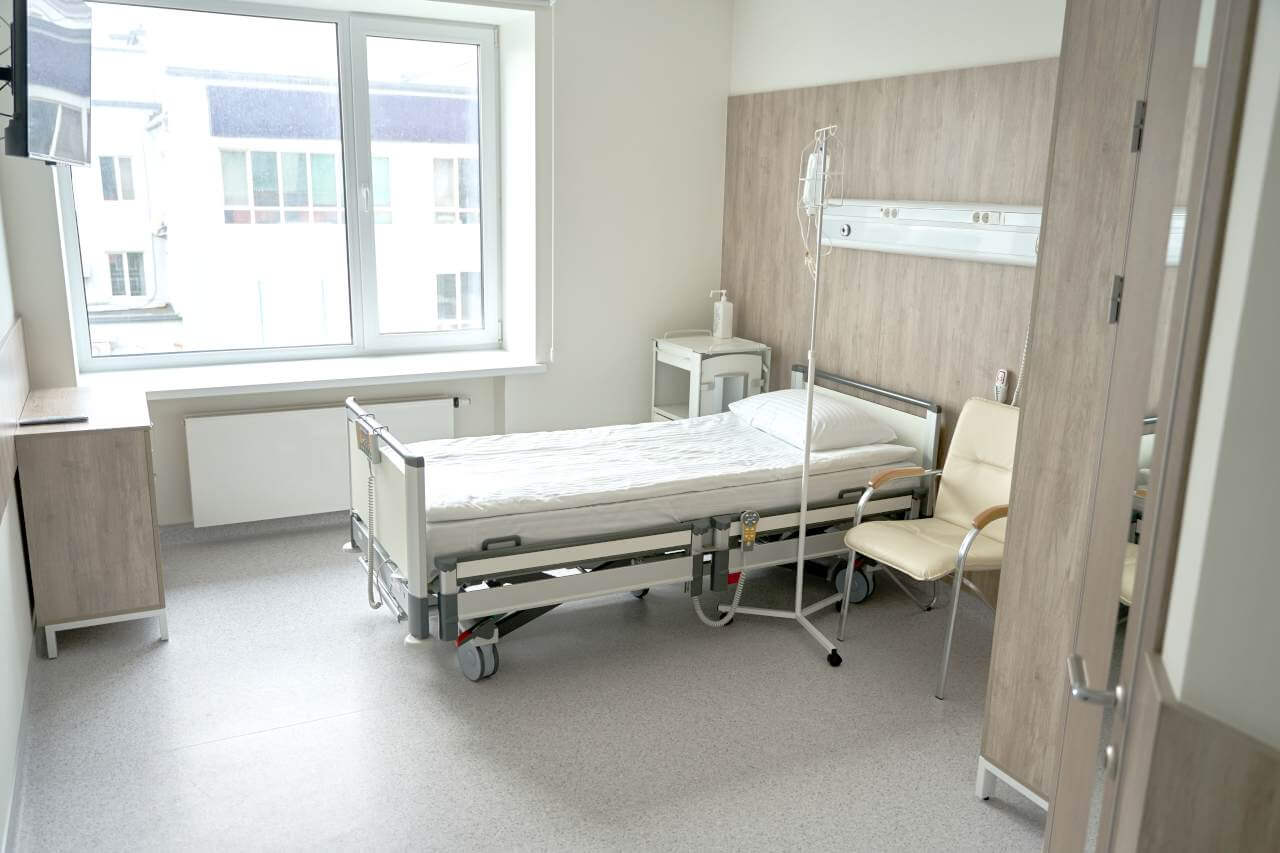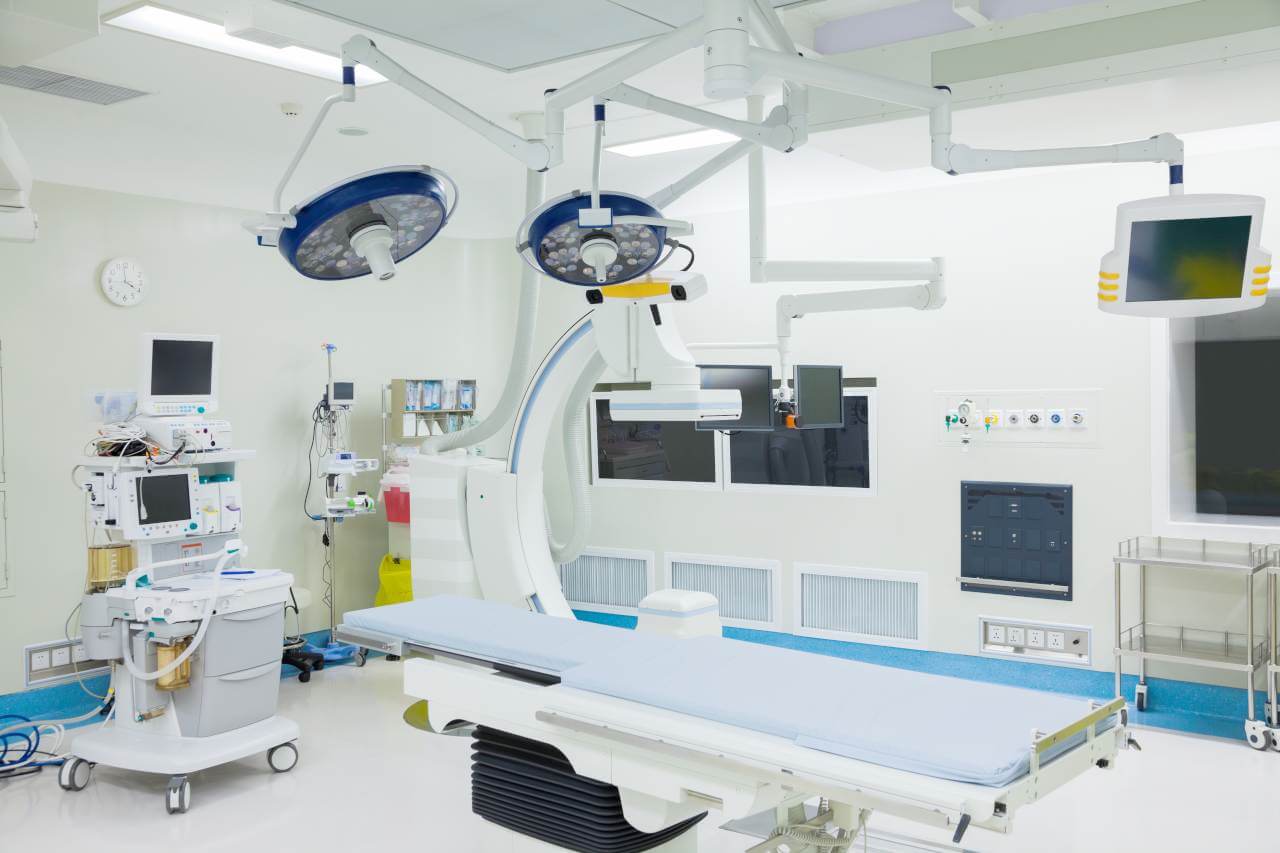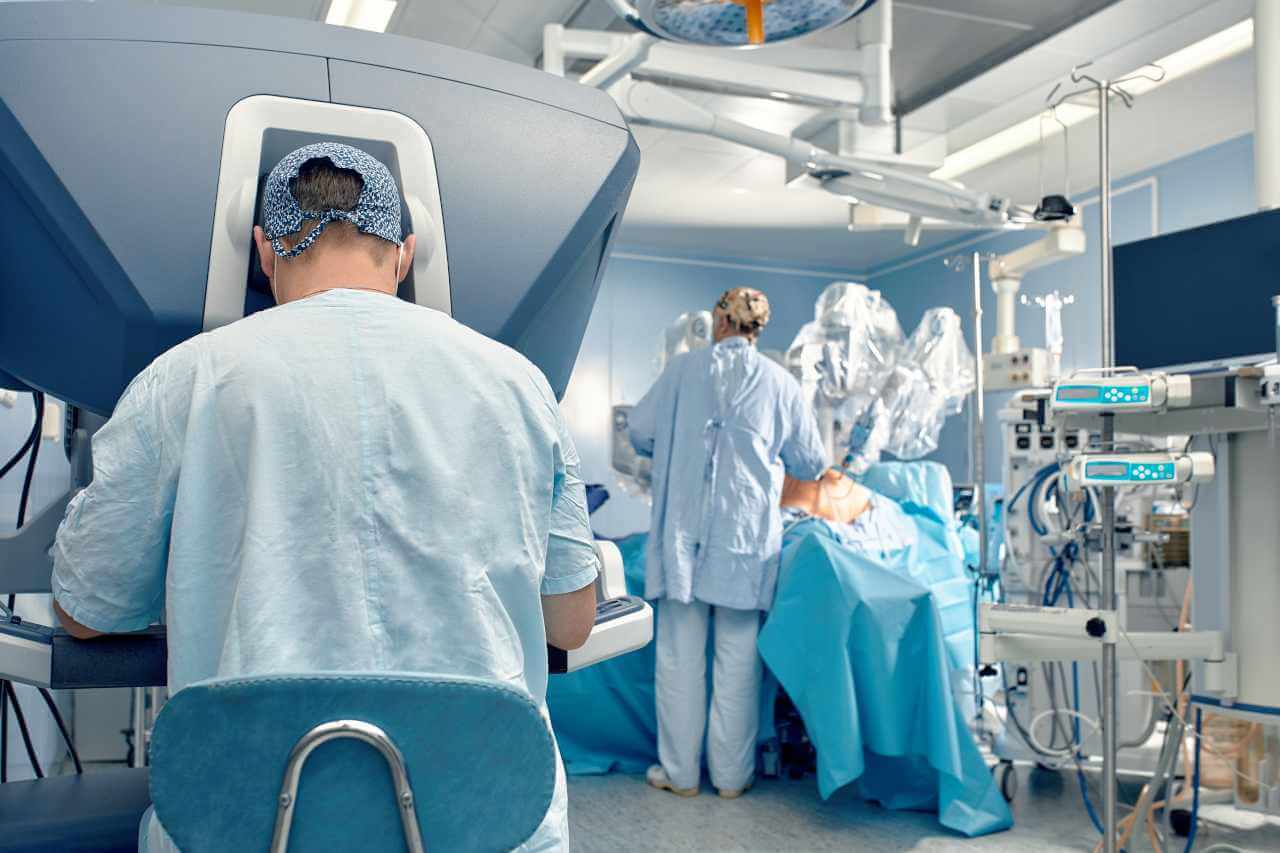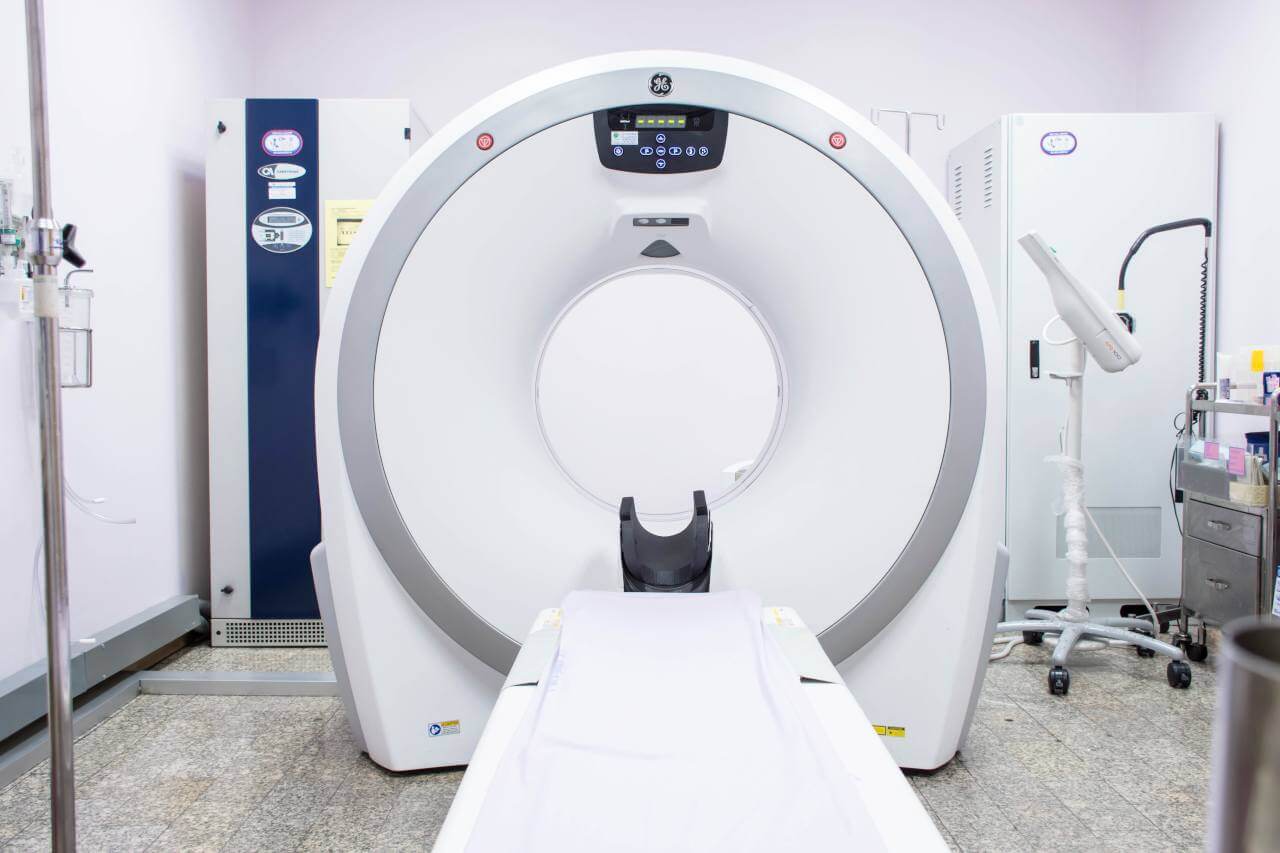
The program includes:
- Initial presentation in the clinic
- clinical history taking
- review of medical records
- physical examination
- laboratory tests:
- complete blood count
- general urine analysis
- biochemical analysis of blood
- TSH-basal, fT3, fT4
- tumor markers (AFP, CEA, СА-19-9)
- inflammation indicators (CRP, ESR)
- indicators of blood coagulation
- abdominal ultrasound scan
- colonoscopy with biopsy (if indicated)
- CT scan/MRI of the abdomen
- tumor board
- consultation of related specialists in radiology, surgery and oncology
- preoperative care
- da Vinci treatment in rectal cancer
- symptomatic treatment
- control examinations
- the cost of essential medicines and materials
- nursing services
- nutrition recommendations
- full hospital accommodation
- explanation of future recommendations
How program is carried out
During the first visit, the physician will conduct a clinical examination and go through the results of the available diagnostic tests. After that, you will undergo the necessary additional examinations, such as the assessment of liver and kidney function, abdominal ultrasound scan, CT scan and MRI. Based on the results of an additional examination, the physician will clarify the stage of the oncological process, choose the volume of the intervention and the type of anesthesia.
Surgery with the da Vinci robot starts with general anesthesia. After anesthesia, the surgeon makes small incisions on the anterior abdominal wall, through which he inserts the da Vinci robot manipulators and a video camera into the abdominal cavity. With the help of manipulators, the doctor ligates large blood vessels and removes the affected areas of the rectum. The video camera continuously transmits a three-dimensional image of the surgical area in 12-fold magnification to the monitor. The surgeon installs drainage into the abdominal cavity and finishes the operation.
The surgery with the da Vinci robotic system significantly reduces the risk of bleeding during the operation and in the postoperative period, and the magnification of the operating field allows the surgeon to remove all the malignant foci.
After the completion of the operation, you will be transferred back to the ward, under the supervision of the attending physician and nursing staff. Due to the minimal invasiveness of the operation and the short duration of general anesthesia, you will not need to stay in the intensive care unit for a long time.
Finally, the attending physician will evaluate the results of control examinations, schedule the date of discharge from the hospital and give you detailed recommendations for further follow-up and treatment.
Required documents
- Medical records
- MRI/CT scan (not older than 3 months)
- Biopsy results (if available)
Service
You may also book:
 BookingHealth Price from:
BookingHealth Price from:
About the department
The Department of Abdominal Surgery, Colorectal Surgery, Endocrine Surgery and Hernia Surgery at the University Hospital Leipzig offers the full range of surgical procedures in its areas of expertise. The department's progressive operating rooms are used to successfully perform operations for diseases of the stomach, intestines, esophagus, rectum, pancreas, thyroid gland, parathyroid glands, and adrenal glands. Priority attention is paid to operations for gastrointestinal cancers. The department's surgical team is exceptionally competent in the treatment of peritoneal carcinomatosis. The clinicians perform cytoreductive operations followed by hyperthermic intraperitoneal chemotherapy (HIPEC) and pressurized intraperitoneal aerosol chemotherapy (PIPAC) for this type of cancer. The therapeutic offer is complemented by the surgical treatment of hernias, with the key interest being in operations for inguinal hernias and anterior abdominal wall hernias. The department also has extensive experience in the surgical removal of soft tissue and bone sarcomas. The department's team of surgeons uses sparing laparoscopic techniques and da Vinci robotic technology in their work. The specialists regularly demonstrate high treatment success rates, confirmed by multiple quality certificates, including certificates from the German Cancer Society (DKG) and recognition of the department as a Center of Excellence for Minimally Invasive Surgery by the German Society of General and Abdominal Surgery (DGAV).
The department is headed by Prof. Dr. med. Ines Gockel, a highly qualified surgeon, whose name is widely known in professional medical circles in Europe and America. She is board certified in abdominal surgery in Germany and America and has repeatedly trained at prestigious medical universities and clinics in the USA. Prof. Ines Gockel has received numerous research awards and is involved in the work of the German Society of General and Abdominal Surgery (DGAV), the German Society of Surgery (DGCH), and the European Society of Surgical Oncology (ESSO).
The department's abdominal surgeons often operate on patients with stomach cancer. The first-line treatment for this oncopathology is gastrectomy, which involves resection or complete surgical removal of the stomach. Surgeons and oncologists determine the extent of gastrectomy individually, depending on the stage of the oncological process. The surgery is performed using minimally invasive techniques or with the da Vinci robotic system. In the first case, doctors make only a few skin and soft tissue incisions no larger than 1.5 cm in size for a surgical approach. The surgeon uses special thin, long instruments to perform the surgery, and a tiny video camera attached to the laparoscope transmits images of the surgical field to the monitor in real time at multiple zooms. The main advantages of minimally invasive surgery are minimal postoperative pain, a short hospital stay, a low risk of adhesions in the abdominal cavity, and barely noticeable postoperative scars.
The department's specialists also successfully operate on patients with stomach cancer using da Vinci robotic technology. During such an operation, all surgical manipulations are performed by the manipulator arms of the robotic system, and the progress of the surgical intervention is controlled by a trained surgeon. The doctor sits at the control console of the robotic system and gives it commands, which it carries out with impeccable accuracy. During a robot-assisted operation, the surgeon can also see the surgical field at multiple zooms on the monitor. The working surfaces of the da Vinci robotic arms are only a few millimeters in size, allowing them to easily reach hard-to-reach areas in the abdominal cavity. In addition, the robotic system eliminates the natural tremors of the human hand and scales its movements, which contributes to the high precision of surgical manipulations. Therefore, operations using the da Vinci robotic technology are characterized by low trauma rates, with the effectiveness being at a high level.
The department is one of the few in Europe with extensive experience in the treatment of peritoneal carcinomatosis using innovative HIPEC and PIPAC methods. Peritoneal carcinomatosis develops against the background of abdominal malignancies such as stomach cancer, colon cancer, pancreatic cancer, etc. Until recently, patients with this type of oncological disease were considered hopeless, but the introduction of the HIPEC procedure into clinical practice has changed the situation dramatically. The department's surgeons start the treatment of peritoneal carcinomatosis with cytoreductive surgery (all visible tumor foci are removed), after which the abdominal cavity is rinsed with a hot solution of chemotherapy drugs for 60-90 minutes. Heating a solution of chemotherapy drugs facilitates their penetration into the tissues, which, in combination with targeted local effects, causes the death of malignant cells.
The department's specialists offer pressurized intraperitoneal aerosol chemotherapy (PIPAC) to patients with peritoneal carcinomatosis. This is a minimally invasive procedure that is highly effective and well-tolerated. This treatment is indicated when a patient with peritoneal carcinomatosis is unable to tolerate an intensive course of systemic chemotherapy, the doctor has doubts about its effectiveness, the patient has ascites with the accumulation of a large amount of fluid in the abdominal cavity, or cytoreductive surgery with HIPEC is contraindicated. The advantage of PIPAC therapy is its local effect on malignant neoplasms in the abdominal cavity. In addition, chemotherapy drugs practically do not enter the systemic circulation, which significantly reduces the risk of side effects. The PIPAC procedure lasts no more than 1 hour and is performed in the operating room under general anesthesia. Treatment is performed in courses, with an interval of 6-8 weeks between procedures.
Colorectal surgery is also a priority area of work for the department's team of doctors. Specialists brilliantly perform surgery for colon cancer, rectal cancer, peritoneal carcinomatosis due to colorectal cancer, and anal cancer. The department's surgeons also operate on patients with benign diseases such as Crohn's disease and ulcerative colitis (inflammatory bowel disease), diverticular disease, rectal prolapse, hemorrhoids, anal fistulas, and other pathologies. The department performs surgery for benign and malignant diseases of the colon, rectum, and anal canal using sparing minimally invasive techniques.
The department's surgeons also operate on patients with hernias. Specialists most often deal with inguinal hernias and anterior abdominal wall hernias. The "gold standard" for the surgical repair of hernias is hernioplasty with mesh implants. These are minimally invasive procedures, which means that patients recover extremely quickly and experience virtually no pain in the postoperative period. Patients typically leave the hospital in 1-2 days.
The department's key clinical areas include the following:
- Abdominal surgery
- Surgery for malignant diseases
- Surgery for stomach cancer
- Surgery for colon cancer
- Surgery for esophageal cancer
- Surgery for peritoneal carcinomatosis
- Surgery for pancreatic cancer
- Surgery for benign diseases
- Surgery for Barrett's esophagus
- Surgery for gastroesophageal reflux disease
- Surgery for achalasia cardia
- Surgery for diabetic gastroparesis
- Surgery for appendicitis
- Surgery for soft tissue and bone sarcomas
- Surgery for malignant diseases
- Colorectal surgery
- Surgery for malignant diseases
- Surgery for rectal cancer
- Surgery for colon cancer
- Surgery for peritoneal carcinomatosis associated with colorectal cancer
- Surgery for anal cancer
- Surgery for benign diseases
- Surgery for Crohn's disease and ulcerative colitis
- Surgery for diverticular disease
- Surgery for rectal prolapse
- Surgery for hemorrhoids
- Surgery for anal fissures
- Surgery for malignant diseases
- Endocrine surgery
- Surgery for benign and malignant thyroid diseases
- Surgery for benign and malignant parathyroid diseases
- Surgery for benign and malignant adrenal diseases
- Surgery for pancreatic neuroendocrine tumors
- Hernia surgery
- Surgery for inguinal hernias
- Surgery for anterior abdominal wall hernias
- Surgery for diaphragmatic hernias
- Other medical services
The department's range of surgical services includes the following:
- Minimally invasive surgery
- da Vinci robot-assisted surgery
- Cytoreductive surgery followed by hyperthermic intraperitoneal chemotherapy (HIPEC)
- Pressurized intraperitoneal aerosol chemotherapy (PIPAC)
- Other surgical treatments
Curriculum vitae
Higher Education and Postgraduate Training
- 1989 - 1995 Medical studies, Johannes Gutenberg University Mainz.
- 1995 United States Medical Licensing Examination (USMLE), Part 1 and Part 2.
- 09.1995 Thesis defense, magna cum laude, Department of Endocrinology, University Hospital Mainz.
- 03.2001 Board certification in General Surgery.
- 03.2005 Board certification in Abdominal Surgery.
- 07.2005 Habilitation, Johannes Gutenberg University Mainz.
- 11.2005 Venia legendi in Surgery, Johannes Gutenberg University Mainz.
- 12.2011 Full Professorship.
- 03.2012 Additional qualification in management, St. Gallen Business School, Switzerland.
- Since 09.2012 Professor of Ethical Leadership, New Westminster College, Vancouver, Canada.
- 09.2012 Qualification of the European Board of Surgery (EBS) in Cancer Surgery.
- 05.2013 Master of Business Administration (MBA) in Healthcare Management, Frankfurt School of Finance and Management, Germany.
- 09.2013 Examination for a license in Specialized Abdominal Surgery.
Fellowships Abroad
- 1996 Department of Pediatric Surgery, University of Houston, Houston, Texas, USA.
- 1999 Department of Colon Surgery, University of Southern California, Los Angeles, California, USA.
- 2003 Department of Esophageal Surgery, University of Washington, Seattle, Washington, USA.
- 2008 Department of Surgery, Queen Mary Hospital, University of Hong Kong, Hong Kong, China.
- 2009 Institute of Heart, Lung and Esophageal Surgery, University of Pittsburgh Medical Center, Pittsburgh, Pennsylvania, USA.
Professional Career
- 06.1995 - 12.1996 Internship, Department of General and Abdominal Surgery, Dr. Horst Schmidt Hospital Wiesbaden, Germany.
- 01.1997 - 03.2003 Residency, Department of General and Abdominal Surgery, Dr. Horst Schmidt Hospital Wiesbaden, Germany.
- 04.2003 - 10.2005 Residency, Department of General, Abdominal and Transplant Surgery, University Hospital Mainz.
- 10.2005 - 09.2014 Associate Professor, Department of General, Abdominal and Transplant Surgery, Johannes Gutenberg University Mainz.
- Since 10.2014 Head Physician, Department of Abdominal Surgery, Colorectal Surgery, Endocrine Surgery and Hernia Surgery, University Hospital Leipzig.
Clinical Interests
- Cancer surgery.
- Minimally invasive surgery.
- Upper gastrointestinal surgery.
- Colorectal surgery.
- Pancreatic surgery.
- Endocrine surgery.
- HIPEC and PIPAC procedures.
- Sarcoma surgery.
Prizes, Awards, and Honors (selected)
- 2004 Research Award, University Hospital Mainz, Germany.
- 2006 Research Award, 10th World Congress of the International Society for Diseases of the Esophagus (ISDE), Adelaide, Australia.
- 2008 Research Award, Drs. Graute and Graute-Oppermann Foundation, Germany.
- 2013 - 2014 Research Award, German Research Foundation, Germany.
- 2014 Award, Else Kröner-Fresenius Foundation, Germany.
Memberships in Professional Societies
- German Society of Surgery (DGCH).
- German Society of General and Abdominal Surgery (DGAV).
- International Society for Diseases of the Esophagus (ISDE).
- Working Group on Upper Gastrointestinal Surgery (CA-OGI) of the German Society of General and Abdominal Surgery (DGAV).
- Society for Surgery of the Alimentary Tract (SSAT).
- European Society of Surgical Oncology (ESSO).
Photo of the doctor: (c) Universitätsklinikum Leipzig
About hospital
The University Hospital Leipzig enjoys high prestige in the European medical arena and is considered one of the best medical complexes in Germany. The hospital operates on the basis of the Faculty of Medicine of the University of Leipzig, so it not only provides effective treatment in almost all areas of modern medicine but also conducts productive research activities, thanks to which many medical innovations have been introduced into clinical practice.
The hospital has more than 1,450 beds. The health of patients is in the safe hands of a large, highly professional team of doctors and nurses, consisting of more than 6,000 employees. The hospital treats more than 56,000 inpatients and over 307,000 outpatients annually. The admission of such a large number of patients for treatment indicates the exceptional quality of medical services and the prestige of the hospital.
The University Hospital Leipzig is a maximum care hospital that represents all areas of medicine, with the exception of cardiac surgery and pediatric cardiology. The hospital structurally consists of 61 specialized departments and 10 institutes. The medical facility has 35 operating rooms equipped with the latest technology. The hospital is one of the few owners of three innovative da Vinci robots, which allow for performing the most sparing and, at the same time, highly effective surgery. In addition, the hospital's pediatric surgeons successfully operate on young patients using da Vinci robotic technology.
Medical care at the hospital is based on a humane attitude toward the patient's life situation. Doctors and nurses are always sensitive to the needs and wishes of each individual, trying to provide support and create the most comfortable environment.
Photo: (с) depositphotos
Accommodation in hospital
Patients rooms
Patients of the University Hospital Leipzig stay in comfortable single and double rooms designed in bright colors. Each patient room has an ensuite bathroom with a shower and a toilet. The furnishings of a standard patient room include an automatically adjustable bed, a bedside table with a pull-out table, a wardrobe, a table and chairs, a TV, and a telephone. Patient rooms have access to Wi-Fi. Many patient rooms offer beautiful views of the picturesque natural scenery or the historic city center of Leipzig.
Meals and Menus
The hospital offers patients and their accompanying persons tasty and balanced meals. Breakfast and dinner are served in the form of buffets, and there are four set menus for lunch, one of which is vegetarian. Mineral water, tea, coffee, and juices are served daily in patient rooms. Fresh fruit and yogurt can also be delivered to the patient's room upon request.
The hospital has a cozy cafe and bistro where you can enjoy a tasty snack or a cup of coffee or tea with a dessert.
Further details
Standard rooms include:
![]() Toilet
Toilet
![]() Shower
Shower
![]() Wi-Fi
Wi-Fi
![]() TV
TV
Accompanying person
Your accompanying person may stay with you in your patient room or at the hotel of your choice during the inpatient program.
Hotel
You may stay at the hotel of your choice during the outpatient program. Our managers will support you for selecting the best option.






